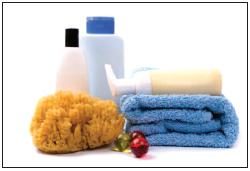 It may not be long before we see shampoos, moisturizers and soaps made with organic ingredients bearing that familiar green and white USDA Organic seal. In November, the U.S. Department of Agriculture’s (USDA) National Organic Program (NOP) voted to enforce its organic food regulations in the personal care arena. In doing so, any products that claim to be organic, but do not carry the USDA seal, must either change their language or meet new USDA standards.
It may not be long before we see shampoos, moisturizers and soaps made with organic ingredients bearing that familiar green and white USDA Organic seal. In November, the U.S. Department of Agriculture’s (USDA) National Organic Program (NOP) voted to enforce its organic food regulations in the personal care arena. In doing so, any products that claim to be organic, but do not carry the USDA seal, must either change their language or meet new USDA standards.
Miles McEvoy, NOP director, told WholeFoods that the NOP has developed some initial priorities, which include developing a strategic plan this month (January 2010) and publishing its final rule. The agency also plans to implement/respond to recommendations from the National Organic Standards Board (NOSB), create and publish a quality manual for the program as well as offer guidance on NOP procedures for certifiers, producers and handlers. The group will also hire additional staff and conduct six to nine staff trainings in 2010 to teach its staff about the new requirements.
The implementation of USDA organic rules to personal care is a large endeavor, McEvoy admitted. “Personal care products are challenging because of overlapping jurisdiction with FDA [U.S. Food and Drug Administration],” he said, noting that NOP has been consulting with the agency about this issue. “Those conversations have revealed that there may be conflicts between the FDA regulations and the NOP regulations when you try to reconcile the two different regulations and try to find a way to label soap in a way that complies with both regulations.”
The USDA NOP standards will be top dog, according to McEvoy. “Bottom line: Certifiers are responsible for ensuring that products labeled as organic under our regulations are labeled in compliance with the NOP regulations. If ACAs [Accredited Certifiers Association] cannot work with the clients to create a product and label that meet the NOP regulations, they should not be certifying the product,” he said.
In July 2009, the NOP posted draft guidelines for the labeling of soap made with organic ingredients. The 100 comments received on the draft were mixed, said McEvoy. “The comments were not conclusive. They ranged anywhere from ‘We love organic soap’ to ‘Soap is a synthetic and should not be certified organic,’ to ‘The NOP regulations were not written for soap.’”
Regardless of the challenges that may lie ahead for both regulations and product manufacturers, many in the industry feel it is an important step toward instilling consumer confidence in the validity of organic personal care items.
Published in WholeFoods Magazine, January 2010











